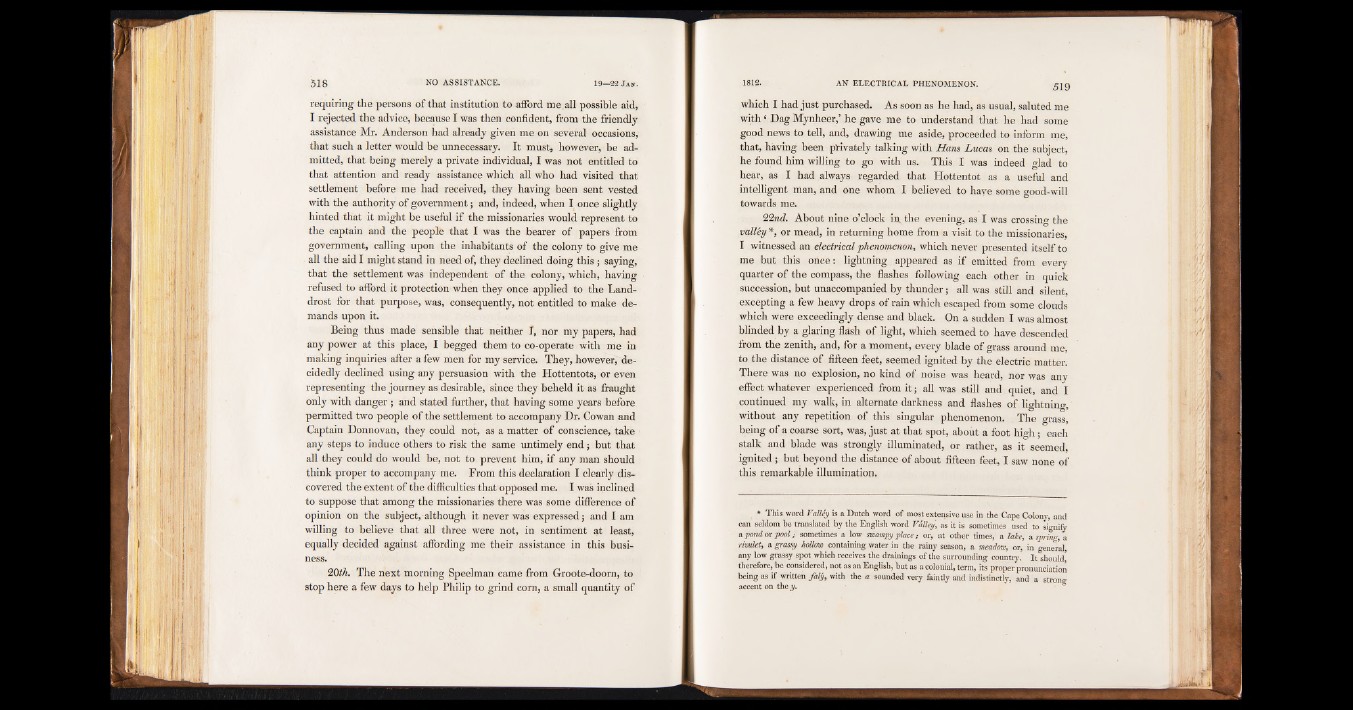
requiring the persons of that institution to afford me,all possible aid,
I rejected the advice, because I was then confident, from the friendly
assistance Mr. Anderson had already given me on several occasions,
that such a letter would be unnecessary. It must, however, be admitted,
that being merely a private individual, I was not entitled to
that attention and ready assistance which all who had visited that
settlement before me had received, they having been sent vested
with the authority of government; and, indeed, when I once slightly
hinted that it might be useful if the missionaries would represent to
the captain and the people that I was the bearer of papers from
government, calling upon the inhabitants of the colony to give me
all the aid I might stand in need of, they declined doing th is; saying,
that the settlement was independent of the colony, which, having
refused to afford it protection when they once applied to the Land-
drost for that purpose, was, consequently, not entitled to make demands
upon it.
Being thus made sensible that neither I, nor my papers, had
any power at this place, I begged them to co-operate with me in
making inquiries after a few men for my service; They, however, decidedly
declined using any persuasion with the Hottentots, or even
representing the journey as desirable, since they beheld it as fraught
only with danger ; and stated further, that having some years before
permitted two people of the settlement to accompany Dr. Cowan and
Captain Donnovan, they could not, as a matter of conscience, take
any steps to induce others to risk the same untimely end ; but that
all they could do would be, not to prevent him, if any man should
think proper to accompany me. From this declaration I clearly discovered
the extent of the difficulties that opposed me. I was inclined
to suppose that among the missionaries there was some difference of
opinion on the subject, although it never was expressed; and I am
willing to believe that all three were not, in sentiment at least,
equally decided against affording me their assistance in this business.
20th. The next morning Speelman came from Groote-doorn, to
stop here a few days to help Philip to grind corn, a small quantity of
which I had just purchased. As soon as he had, as usual, saluted me
with ‘ Dag Mynheer,’ he gave me to understand that he had some
good news to tell, and, drawing me aside, proceeded to inform me,
that, having been privately talking with Hans Lucas on the subject,
he found him willing to go with us. This I was indeed glad to
hear, as I had always regarded that Hottentot as a useful and
intelligent man, and one whom I believed to have some good-will
towards me.
22nd. About nine o’clock in, the evening, as I was crossing the
valley *, or mead, in returning home from a visit to the missionaries,
I witnessed an electrical phenomenon, which never presented itself to
me but this once: lightning appeared as if emitted from every
quarter of the compass, the flashes following each other in quick
succession, but unaccompanied by thunder; all was still and silent,
excepting a few heavy drops of rain which escaped from some clouds
which were exceedingly dense and black. On a sudden I was almost
blinded by a glaring flash of light, which seemed to have descended
from the zenith, and, for a moment, every blade of grass around me,
to the distance of fifteen feet, seemed ignited by the electric matter.
There was no explosion, no kind of noise was heard, nor was any
effect whatever experienced from i t ; all was still and quiet, and I
continued my walk, in alternate darkness and flashes of lightning,
without any repetition of this singular phenomenon. The lrrass,
being of a coarse sort, was, just at that spot, about a foot high; each
stalk and blade was strongly illuminated, or rather, as it seemed,
ignited ; but beyond the distance of about fifteen feet, I saw none of
this remarkable illumination.
* This word Valley is a Dutch word of most extensive use in the Cape Colony, and
can seldom be translated by the English word VaUey, as it is sometimes used to signify
a pond or p o o l; sometimes a low swampy place ; or, at other times, a lake, a spring, a
rimlet, a grassy hollow containing water in the rainy season, a meadow, or, in general
any low grassy spot which receives the drainings of the surrounding country. I t should
therefore, be considered, not as an English, but as a colonial, term, its proper pronunciation
being as if written fa ly , with the a sounded very faintly and indistinctly, and a strong
accent on the y.